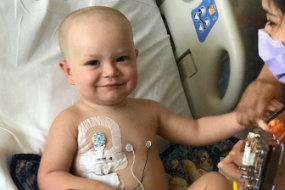Condition
Pediatric Allergic and Immunologic Disorders
What You Need to Know
Allergies and immunological disorders are problems of the immune system.
Key Symptoms
The most common symptoms of allergies can include:
- Stuffy nose
- Sneezing
- Itching
- Weakened or overactive immune system
- Infections
Diagnosis
Doctors typically diagnose allergic and immunologic disorders by:
- Reviewing a patient's medical history
- Skin tests
- Blood tests
Treatment
The three most effective ways to treat allergies are:
- Avoidance of allergens
- Immunotherapy
- Medication
Schedule an Appointment
Our pediatric specialists provide personalized care for your child’s physical, mental and emotional health needs. Meet our providers and schedule an appointment today.
Frequently Asked Questions
What are allergic and immunologic disorders?
How are allergies treated in children?
What is avoidance?
What is immunotherapy (allergy shots)?
How is immunotherapy administered in children?
How often are immunotherapy injections necessary for children?
Symptom improvement and immunotherapy for children
Are there side effects to immunotherapy in children?
Medication as treatment for allergy in children
What are antihistamines?
What are decongestants?
Meet the Providers Who Treat Allergic and Immunologic Disorders
Departments that Treat Allergic and Immunologic Disorders

Allergy and Immunology
At Children's National, children with allergies and complex immune disorders benefit from specialists who exclusively treat pediatric conditions. The team provides children and teens with greater access to experts in asthma, allergies, and both inherited and acquired immune system disorders. Learn about our program.

Help Kids and Make a Difference
Invest in future cures to help children have brighter futures.









